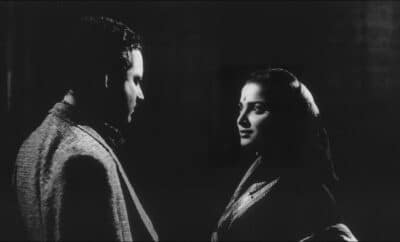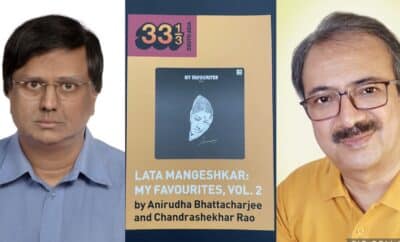Collections
Majrooh Sultanpuri and Laxmikant Pyarelal – Sharp Shades of Romance
Many a time, we tend to remember a song if the composition and singing are good; it doesn’t then matter how the lyrics are. Lyrics thus remain a somewhat ignored element. However, there are many golden era lyricists, whose lyrics are remembered as much as the music. For example, we remember Shailendra’s lyrics for a deep philosophy in simple words; we remember Gulzar’s lyrics, because he has the ability translate our deep, incorporeal feelings into words, albeit in an abstract way; we remember Sahir Ludhinavi’s songs because of simplicity coupled with rich poetry and an outstanding way in which he highlights realities of life. We cannot of course miss another eminent lyricist in this list – Majrooh Sultanpuri. His lyrics convey seemingly ordinary messages in unique and astonishing ways. His expression of love and romance in his own, the-only-of-its-kind style remains unmatched. He is considered as one of the avant-grade Urdu poets of the 20th century, and his astounding poetic skills reflect in his lyrics, more often than not.
Born on 1 October 1919 as Asrar ul Hassan Khan in in Sultanpur (Uttar Pradesh), Majrooh Sultanpuri was a struggling Hakim in Unani medicine, pursuing poetry as just a hobby. He once happened to recite a ghazal at a mushaira in Sultanpur. The ghazal was a hit and Majrooh decided to drop his fledgling medical practice and started focusing on poetry. He soon became a well-known poet and a disciple of Jigar Moradabadi, one of the then top names in Urdu poetry. In 1945, Majrooh visited Mumbai (then Bombay) to attend a mushaira, where one of the impressed listeners was the film producer A.R. Kardar. He offered Majrooh to write for his films, but Majrooh refused because he didn’t think very highly of film songs. However, Jigar Moradabadi convinced him, and A.R. Kardar then took him to composer Naushad, who put the young poet to test. Having liked what he wrote, Naushad signed him as the lyricist for the film Shah Jehan (1946). The songs of the film, particularly the K.L. Saigal classic “Jab dil hi toot gaya”, became immensely popular, and Majrooh never looked back thereafter. Starting with Naushad, he went on to work with many golden era composers like Anil Biswas, Madan Mohan, O.P. Nayyar, Roshan, Salil Chowdhury, Chitragupt, the Burmans, Kalyanji – Anandji, and Laxmikant – Pyarelal, with his collaboration with the Burmans, particularly S.D. Burman, standing out.
His poetry did not fade out even after the golden era and he worked also with a few post-golden-era composers like Anand – Milind and Jatin – Lalit. Just like his golden era classics, his modern era songs like “Pehla nasha, pehla khumar”, “Bin tere sanam, mar mitenge hum” and “Ae mere humsafar, ek zara intazar” also became very popular.
Besides the Burmans, his association with the celebrated composer duo Laxmikant – Pyarelal is also noteworthy. It started in the very second year of the composer duo’s career, with Dosti (1964). They worked together in 46 films, which is the second highest number of films by Laxmikant Pyarelal with any lyricist, after 302 films with Anand Bakshi.
Laxmikant – Pyarelal gloriously reigned over the musical space of Hindi films for three and a half decades and were arguably the most successful composer duo of Hindi cinema. Starting their career as musicians and assistants to many veteran composers in the 1950s, they went on to become an independent composer duo with Parasmani (1963), which was a major musical hit. Their success spree that started with their debut in 1963 continued till 1998, until Laxmikant passed away. Various accounts quote varying numbers of films for which they composed music, the lowest number being as high as 500! Imaginative tunes, innovative orchestration, adventurous experimentation, and the typical rhythm on tabla and dholak (accompanied many times by bongo and conga) were the remarkable features of their music.
They were completely in their element mainly in the first decade of their career, before their innovative approach somewhat faded away, as they resorted to tried and trusted predictable tunes, which were gaining popularity with the changing taste of the public. And when it came to working together with Majrooh Sultanpuri in this decade, they seem to have poured their hearts in the compositions (no idea whether it was just a coincidence, or Majrooh’s poetry was instrumental in this, or there was some other reason). Do you agree?
1. Chaahunga Main Tujhe Saanjh Sawere (Dosti – 1964)
The first joint film of Laxmikant – Pyarelal and Majrooh Sultanpuri, Dosti, fetched Laxmikant – Pyarelal their first ever and Majrooh his only Filmfare award. The film was a big hit, and so was its Rafi-dominated soundtrack. The songs like “Chaahunga main tujhe saanjh sawere”, “Koi jab raah na paaye” and “Raahi manwa dukh ki chinta” are popular even today.
The Rafi solo “Chaahunga main tujhe saanjh sawere” is soulful expression of agony as well as deep love of a friend. Laxmikant – Pyarelal’s composition, Rafi’s heart wrenching rendition and Majrooh’s brilliant lyrics effectively bringing out the ironical feelings of agony and love make it a musical masterpiece.
2. Kya Kahoon, Aaj Kya Baat Hai? (Dillagi – 1966)
Starring Mala Sinha and Sanjay Khan, Dillagi was a romantic drama film with a melodious soundtrack. This Lata solo shines amidst all the songs in it. The song has an unusual pattern with one line in the refrain being of average length and the other being much longer than the former (and consequently composed in a very long musical phrase). Though the entire refrain sounds very melodic even with the unusually long lines, if you try to recite the lyrics without the tune, it almost seems as though you are reciting a prose. This would give an idea as to how unique the composition is. A little slow paced, but swaying tune, hypnotic orchestration, Lata Mangeshkar’s effortless movement from the lower octave to the higher octave and Majrooh’s apt words together make this an outstanding composition.
3. Wo Hain Zara Khafa Khafa (Shagird – 1967)
The soundtrack of this Saira Banu – Joy Mukherjee starrer comedy drama film is one of Laxmikant – Pyarelal’s outstanding works. Among all the euphonious songs, the romantic Lata – Rafi duet “Wo hain zara khafa khafa” stands out. It is a perfect package comprising superb orchestration portraying playful romance of the couple on a pleasant, lonely evening; adorable rendition by Lata Mangeshkar and Mohammed Rafi perfectly complementing each other; and Majrooh Sultanpuri’s suitable words.
4. Patthar Ke Sanam (Patthar Ke Sanam – 1967)
This is yet another amazing soundtrack by Laxmikant – Pyarelal. The title song of the film remains popular to date, as a brilliant expression of heartbreak. Mohammed Rafi and Majrooh Sultanpuri appositely support the pathos-laden composition with emotive rendition and befitting words respectively. Particularly, Rafi’s rendition drenched in poignancy and his seamless movement from the very low notes to the very high notes take this composition several notches up.
5. Na Ja, Kahin Ab Na Ja (Mere Hamdam Mere Dost – 1968)
The romantic drama film with Dharmendra and Sharmila Tagore as the protagonists also has a mellifluous soundtrack composed by Laxmikant – Pyarelal, with beautiful lyrics by Majrooh. The title song has a nonesuch expression of love in the form of Laxmikant – Pyarelal’s splendid composition and Rafi’s graceful singing. The song is a brilliant example of Majrooh’s dexterous poetry in his peculiar style.
https://www.youtube.com/watch?v=MNUk-o9xQaw
6. Je Hum Tum Chori Se (Dharti Kahe Pukar Ke – 1969)
This song shows the playful and agrestic romance between the boisterous couple Jeetendra and Nanda. Laxmikant – Pyarelal’s energetic tune with catchy rhythm and the fantastic chemistry between Lata Mangeshkar and Mukesh make you tap your feet with the song end-to-end. Majrooh’s rustic lyrics show that he had a mastery over not only Urdu, but also regional Hindi.
7. O Ghata Saanwari (Abhinetri – 1970)
The soundtrack Abhinetri is another masterwork by Laxmikant – Pyarelal. While all the songs form the film are memorable, the saccharine Lata solo “O ghata saanwari” deserves a special mention. Majrooh beautifully expresses the drizzling desires of a young girl aroused by the showers outside. Laxmikant Pyarelal’s honeyed tune and fitting orchestration make this expression adorable; and Lata Mangeshkar’s commensurate nectar-drenched rendition glorifies Hema Malini’s beauty and takes the composition to an altogether different level.
8. Taaron Mein Saj Ke (Jal Bin Machhli, Nritya Bin Bijli – 1971)
The soundtrack of this romantic musical drama film comprises several exquisite songs rendered by Lata Mangeshkar and Mukesh. Laxmikant – Pyarelal’s music perfectly suits V. Shantaram’s grandeur and is quite off beat as compared to Laxmikant – Pyarelal’s usual style. This was the first Indian film, all the songs from which were recorded in stereophonic sound.
The haunting Mukesh solo “Taaron mein saj ke, apne sooraj se, dekho dharti chali milne” catches hold of our mind due to the grand and somewhat spooky orchestration and mind-blowing rhythm. Majrooh has brilliantly used the metaphor of the earth going to meet the sun for the protagonist Sandhya who runs away from her wealthy father to pursue her singing and dancing passion. Mukesh seems to be a perfect choice for this song, though it is quite eccentric, as compared to his usual poignant or romantic songs.
The prelude seems to be inspired by the theme music of the western film The Good, The Bad and The Ugly (1966).
9. Patta Patta, Boota Boota Haal Hamaara Jaane Hai (Ek Nazar – 1972)
This Lata – Rafi duet from another impressive soundtrack by Laxmikant – Pyarelal can be undoubtedly counted among their best works. the orchestration is mesmeric, and the rhythm is captivating. Majrooh’s lyrics is another high point of the song. The words in the refrain are inspired by Mir Taqi Mir’s ghazal starting with the same couplet. Majrooh perhaps wanted to pay tribute to the great 18th century poet through this song.
10. Roz Shaam Aati Thi (Imtihan – 1974)
Once you are in love, everything around you starts seeming different. You become a beholder with beauty everywhere in your sight. The surrounding is painted in new shades of vibrant colours. This romantic Lata solo describes such an unforeseen evening which is looking more colourful to Tanuja in the company of her recently found love, Vinod Khanna. Majrooh’s simple yet appropriate words and Lata Mangeshkar’s honeyed rendition enhance the beauty of this fast-paced composition. Lata Mangeshkar sounds as fresh and sweet as she does in Laxmikant – Pyarelal’s first film.
For sure you now agree that the colours of Laxmikant – Pyarelal’s compositions were a little more vivid in the company of the prolific poet Majrooh Sultanpuri.




Sanket
October 2, 2021 at 2:53 pm
Lovely piece–never heard the song “kya kahoon, aaj kya baat hai?” before. Thanks for sharing this rare gem. “O ghata sawari” and “roz shaam aati thi” are personal favorites.
Yogesh
October 5, 2021 at 4:35 pm
Thanks, Sanket 🙂
Nikhil Oltikar
September 17, 2022 at 11:49 am
? no:10. Very unique number.
Madhupati Sharma
September 3, 2024 at 12:31 pm
Shahjehan in lyricyst. Only lyricist with Dada Saheb Phalke award. Gulzar is multifaceted talent. Taron mein sajke ..a pure Hindi song reminds Bharat Vyas or Pradeep style. Good weaving of select gems.
YOGESH
September 29, 2022 at 4:08 pm
Indeed, Nikhil ji!